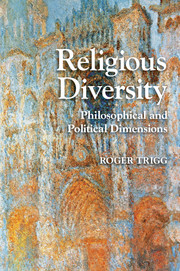Book contents
- Frontmatter
- Dedication
- Contents
- Introduction
- 1 The Challenge of Religious Diversity
- 2 Do Religions Claim Truth?
- 3 Religious Pluralism
- 4 The Roots of Religious Belief
- 5 Does Disagreement Undermine Theism?
- 6 Education and Religious Diversity
- 7 Truth and Coercion
- 8 Religious Diversity and Identity
- 9 Religion as Personal Preference
- 10 Freedom and Religion
- Bibliography
- Index
- References
9 - Religion as Personal Preference
Published online by Cambridge University Press: 05 June 2014
- Frontmatter
- Dedication
- Contents
- Introduction
- 1 The Challenge of Religious Diversity
- 2 Do Religions Claim Truth?
- 3 Religious Pluralism
- 4 The Roots of Religious Belief
- 5 Does Disagreement Undermine Theism?
- 6 Education and Religious Diversity
- 7 Truth and Coercion
- 8 Religious Diversity and Identity
- 9 Religion as Personal Preference
- 10 Freedom and Religion
- Bibliography
- Index
- References
Summary
RATIONAL CHOICE THEORY
The issue of group rights and individual rights, and the tug-of-war between the doctrinal purity of institutions and the consciences of their individual members, is related to a perennial problem in the philosophy of social science. Is any society simply constituted by individuals and their decisions, or does it have some ongoing collective identity? The question is whether social structures can have independent causal influences on their members or whether the line of cause and effect only goes from the bottom up, from individuals to the organizations they create. Within Christianity, differing doctrines of the nature of the Church or churches, as one mystical body, even the Body of Christ, or a voluntary community or communities, have long theological pedigrees, and have themselves been divisive.
These disagreements reflect controversies about the nature of the relation of the individual and society. Marxism has stressed the social and the collective, with the causal influence of social and economic structures on human lives. Other views see interactions between individuals as the source of social relationships. Many see social relationships in the way economists analyze economic behavior, in terms of rational decisions by individuals about the perceived costs and benefits of certain courses of action. The questionable idea is that people will make decisions only in what they see as in their own interests.
- Type
- Chapter
- Information
- Religious DiversityPhilosophical and Political Dimensions, pp. 151 - 168Publisher: Cambridge University PressPrint publication year: 2014

